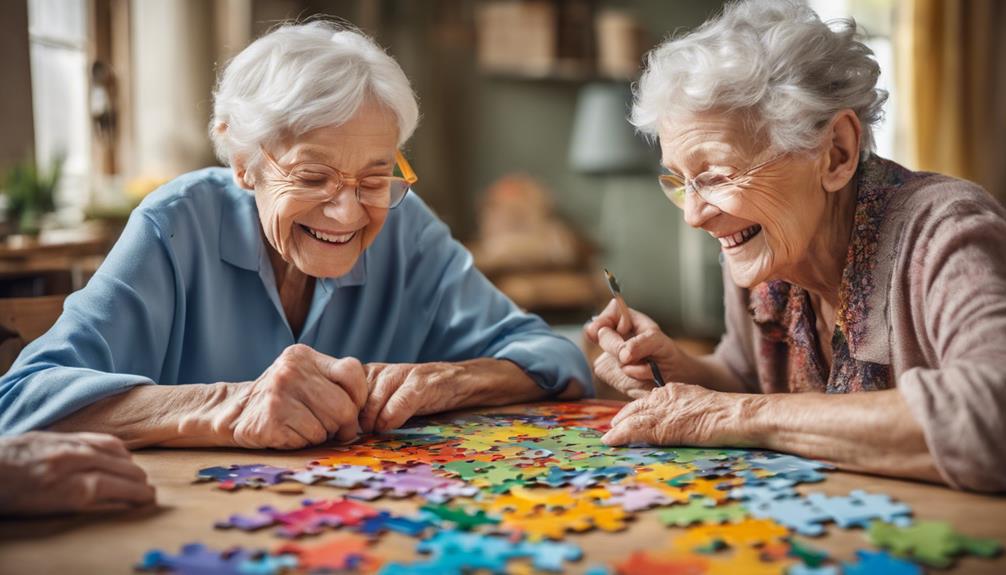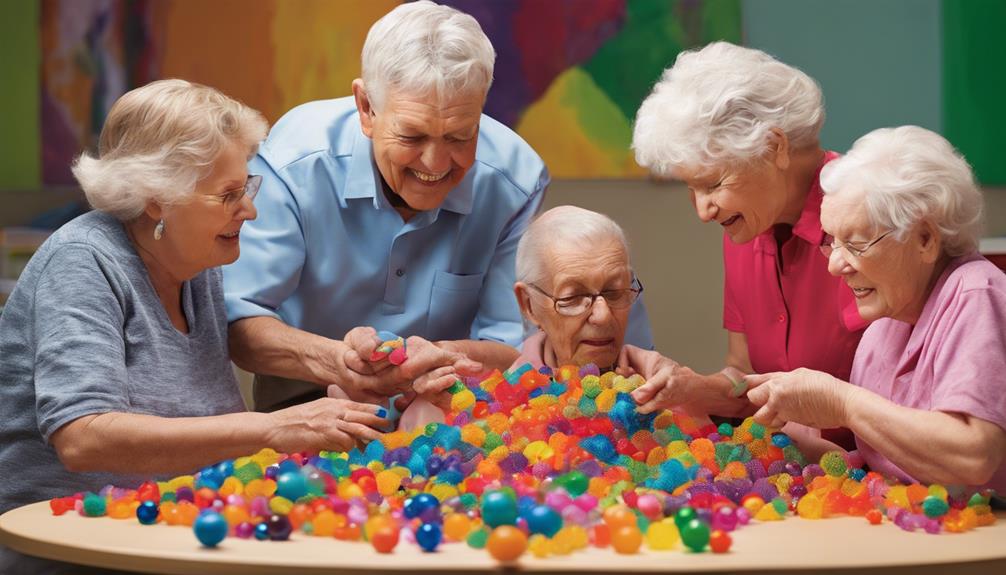Exploring the diverse range of games designed for people with dementia is akin to discovering hidden gems within a neglected treasure chest. As we delve into the extensive selection of activities aimed at enhancing cognitive abilities and fostering moments of happiness, we come to appreciate the profound influence these endeavors can have on individuals coping with memory impairment.
From sparking reminiscence to fostering connection and laughter, the world of games for dementia patients offers a multifaceted approach to enhancing their well-being. Join us as we delve into the realm of games that transcend mere entertainment, offering a gateway to a world where memories are cherished, and minds are kept agile.
Key Takeaways
- Memory-boosting games like Uno and gin rummy enhance cognitive function.
- Interactive cognitive challenges improve memory, reasoning, and provide a sense of accomplishment.
- Social engagement activities enhance cognitive skills, memory, and foster community connections.
- Sensory stimulation therapies promote memory recall, relaxation, and meaningful interactions.
Memory-Boosting Card Games
Memory-boosting card games, such as Uno and gin rummy, offer engaging and effective ways to enhance cognitive function in individuals with dementia. These games aren't only enjoyable but also serve as powerful tools to stimulate memory recall and problem-solving abilities. By engaging in card games, individuals with dementia can exercise their minds, keeping them active and sharp.
One of the significant advantages of memory-boosting card games is the social interaction they promote. These games provide a platform for individuals to connect with others, fostering communication and companionship. The sense of accomplishment that comes from successfully playing a card game can boost self-esteem and overall well-being.
Moreover, card games are accessible and familiar, making them suitable for individuals at various stages of dementia. The simplicity of the game rules coupled with the mental stimulation they offer makes card games an ideal choice for those looking to engage cognitively. In essence, playing card games can be a holistic experience, benefiting not only cognitive function but also emotional and social well-being.
Interactive Puzzle Challenges

Interactive puzzle challenges are a beneficial and engaging way to enhance cognitive function and stimulate mental activity in individuals with dementia. Engaging in puzzle challenges can help improve memory, reasoning skills, and overall cognitive function. These activities provide a sense of accomplishment and satisfaction, boosting the individual's confidence and mood. Whether it's jigsaw puzzles, word puzzles, or other interactive puzzles, they offer a variety of mental stimulation that keeps the brain active and promotes cognitive health.
One of the significant advantages of puzzle challenges is their adaptability. These activities can be tailored to the individual's skill level and preferences, making them a versatile tool for cognitive stimulation. By customizing the puzzles, caregivers can ensure that the person with dementia is adequately challenged without feeling overwhelmed. This personalized approach enhances the effectiveness of the activity and maximizes its benefits for cognitive well-being. Engaging in interactive puzzles not only provides mental stimulation but also creates a positive and enjoyable experience for individuals living with dementia.
Social Bingo Gatherings
Engaging in Social Bingo gatherings offers individuals with dementia a fun and interactive way to enhance cognitive skills and foster social connections within a supportive environment. Social Bingo not only provides entertainment but also helps improve memory, concentration, and attention in a group setting. The sense of community and friendly competition during Bingo games can create a supportive environment where participants feel included and connected. The structured nature of Bingo games offers a sense of routine and familiarity, which can be comforting for individuals with dementia.
| Benefits of Social Bingo Gatherings | |
|---|---|
| Social Interaction | Opportunities for individuals to engage with others |
| Cognitive Skills | Improves memory, concentration, and attention |
| Supportive Environment | Creates a sense of community and inclusivity |
Social Bingo gatherings not only stimulate the mind but also nurture the spirit, providing a holistic approach to enhancing the well-being of individuals with dementia through social engagement and cognitive stimulation.
Sensory Stimulation Activities

Exploring sensory stimulation activities can offer individuals with dementia a variety of engaging experiences to enhance their cognitive and emotional well-being. Tactile stimulation, such as sensory bins and aromatherapy playdough, can provide a comforting and interactive experience. Memory boxes are valuable tools that promote memory recall and reminiscence, fostering a sense of connection through sensory engagement. Engaging in sensory storytelling not only enriches the overall sensory experiences but also provides cognitive stimulation, triggering memories and sparking conversations.
A sensory garden creates a therapeutic environment for individuals with dementia to explore and relax, benefiting their emotional well-being. Activities like arranging flowers in the garden can improve memory and cognition while offering a calming and enjoyable experience. By incorporating sensory stimulation activities into daily care routines, caregivers can provide meaningful interactions and support cognitive functions, ultimately enhancing the quality of life for individuals with dementia.
Physical Movement Games
As we consider the importance of maintaining physical well-being for individuals with dementia, incorporating physical movement games into their daily activities can play a significant role in enhancing their overall quality of life. Physical movement games such as chair exercises, dancing, and balloon volleyball aren't only enjoyable but also help improve mobility and balance in individuals with dementia.
These activities provide gentle physical activity, promoting social engagement, which is crucial for their well-being. Engaging in games like scarf dancing, dress-up activities, Tai Chi, balloon batting, and step dancing can contribute to maintaining health and cognitive function in individuals with dementia.
Additionally, outdoor ventures like gardening and nature walks can reduce agitation and boost mood. Sensory stimulation integrated into physical movement games, such as sensory storytelling and memory boxes, enhances experiences and cognitive benefits further.
Frequently Asked Questions
How Do You Keep Dementia Patients Busy?
We keep busy dementia patients engaged through a variety of stimulating activities. From cognitive games like puzzles and card games to creative endeavors such as painting and scrapbooking, we offer a range of options.
Physical activities like dancing and gardening enhance movement and well-being, while relaxation techniques like meditation and nature walks promote calmness.
Social engagements through family visits and group activities foster connections and socialization, ensuring a fulfilling experience for all.
What Is the Best Game for Dementia Patients?
The best game for dementia patients is one that encourages engagement and promotes cognitive stimulation. It should be easy to understand, enjoyable, and foster a sense of accomplishment.
Finding activities that are familiar, simple, and interactive can help maintain mental sharpness and enhance overall well-being.
It's important to choose games that cater to individual preferences and abilities, ensuring a positive and enriching experience for those living with dementia.
How Do You Entertain Someone With Dementia?
We entertain someone with dementia by engaging in activities that stimulate their mind, body, and emotions. Encouraging social interaction, creativity, physical exercise, relaxation, and social engagement can all contribute to their overall well-being.
It's important to tailor activities to their preferences and abilities while providing a supportive and understanding environment. By focusing on their individual needs and interests, we can help them feel engaged, valued, and connected.
What Are 3 Things to Never Do With Your Loved One With Dementia?
We should never argue or correct our loved ones with dementia, as it leads to frustration.
Rushing them causes confusion, so we must avoid hurrying them.
Ignoring their emotions makes them feel isolated, so we should always acknowledge their feelings.
Using complex language overwhelms them, so we need to keep instructions simple.
Neglecting their need for a familiar environment can be distressing, so we must ensure consistency in their surroundings.
Conclusion
As we gather around the table to play these games for people with dementia, we not only exercise our minds but also create unforgettable moments of joy and connection.
The laughter, the shared memories, and the sense of accomplishment all come together to form a beautiful tapestry of love and support.
Let's continue to play, to learn, and to grow together, embracing the power of games to enhance our lives and those of our loved ones living with dementia.









